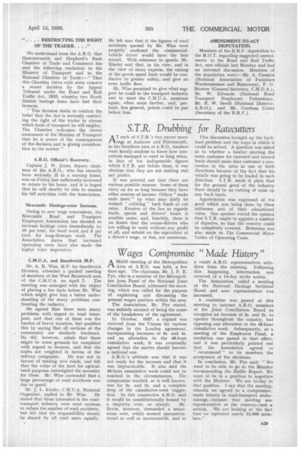Wages Compromise " Made History
Page 39

If you've noticed an error in this article please click here to report it so we can fix it.
AMASS meeting of the Metropolitan Area of A.R.O. was held, a few days ago. The chairman, Mr. J. F. E. Pye, who is a member of the Metropolitan Area Panel of the National Joint Conciliation Board, addressed the meeting, which was called for the purpose of explaining and discussing the present wages position within the area.
The Association, Mr. Pye stated, was unfairly accused of being the cause of the breakdown of the agreement.
In October, 1937. a request was received from the Unions for various changes in the London agreement, incorporating increases of 6s. and 4s. and an alteration to the 48-hour cumulative week; it was eventually agreed that the matter should become a national one.
A.R.O.'s attitude was that it was not ready for the increase and that it was impracticable. It also said the 48-hour cumulative week could not be touched in the circumstances. The compromise reached, as is well known, was for 3s. and 2s. and a complete drop of the cumulative-week suggestion. In this connection A.R.O. said it would be constitutionally bound by
a majority vote, as always. Mr. Bevin, however, demanded a unanimous vote, which seemed unconstitutional as well as unreasonable, and as
a result A.R.O. representatives withdrew from the meeting. Following this happening, information was received of a 14-day strike notice.
The Association called a meeting of the National Haulage Sectional Board and area representation was increased.
A resolution was passed at this meeting to instruct A.R.O. members of the Joint Conciliation Board to recognize an increase of 3s. and 2s. to operate throughout the country, but opposing any alteration to the 48-hour cumulative week. Subsequently, at a meeting of the Employers Panel, a resolution was passed to that effect, and it was particularly pointed out that the Association agreed ro " recommend " to its members the acceptance of the decisions.
In conclusion, Mr. Pye said: " We want to be able to go to the Minister recommending the Baillie Report. We want to* be in a position to negotiate with the Minister. We are to-day in that position. I say that the meeting, wherein we agreed to a compromise, made history in road-transport undertakings—because that meeting was representative of the country—not a section. We are looking at the fact that we represent nearly 15,000 members."




















































































